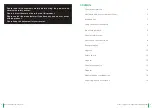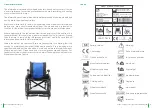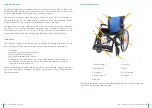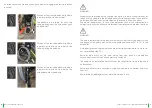
Hold the seat with both hands and push down to engage the seat in the seat
locators.
Position of the front wheelchair tie down
restraint and the tie down label.
The position is the same for both the
self-propelling and the attendant push
wheelchairs.
Position of the rear wheelchair tie down
restraint and the tie down label on the
self-propelling wheelchair.
Position of the rear wheelchair tie down
restraint and the tie down label on the
attendant push wheelchair.
WARNING
Parents or care providers may consider the option, in some circumstances, for
their child is to remain in their wheelchair whilst in transport due to the level of
posture control and comfort provided by the set up in the wheelchair.
We would recommend in such circumstances that a risk assessment be
carried out by your healthcare professional and relevant competent persons.
WARNING
The pelvic restraint belt must be worn low across the front of the pelvis so that
the angle of the pelvic belt is within the preferred zone of 30° to 75° to the
horizontal.
A steeper (greater) angle within the preferred zone is desirable i.e. closer to,
but never exceeding 75°.
Restraint belts must not be held away from the body by wheelchair
components or parts such as the armrests or wheels.
The upper torso restraint belt must fit over the shoulder and across the chest
as illustrated,
Restraint belts must be adjusted as tightly as possible consistent with user
comfort.
Restraint belt webbing must not be twisted when in use.
11
10
innovation that moves you
ortho-europe.com / greencaremobility.com


























